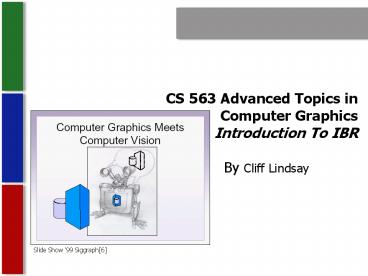CS 563 Advanced Topics in Computer Graphics Introduction To IBR - PowerPoint PPT Presentation
Title:
CS 563 Advanced Topics in Computer Graphics Introduction To IBR
Description:
Title: Intro to IBR Author: Cliff Lindsay Last modified by: TFCCS Created Date: 6/21/2002 3:49:13 PM Document presentation format: On-screen Show Other titles – PowerPoint PPT presentation
Number of Views:152
Avg rating:3.0/5.0
Title: CS 563 Advanced Topics in Computer Graphics Introduction To IBR
1
CS 563 Advanced Topics in Computer
GraphicsIntroduction To IBR
- By Cliff Lindsay
Slide Show 99 Siggraph6
2
What Is IBR?
- IBR
- Multidisciplinary field that includes computer
vision and graphics - Techniques that replace and/or augment polygon
models - Primary data pre-rendered images and photographs
as input
The Rendering Spectrum 3
3
Where Did IBR Come From?
- Photo-realism
- Modeling ability has been stifled by rendering
advancements - Availability of inexpensive digital image
acquisition hardware - Recent graphics accelerators trends
- Necessity to render object that cant be rendered
using polygons
4
Tenants and Common Techniques of IBR
- Rendering time is decoupled from scene complexity
- Images are used as input
- Exploits coherence
- Pre-calculation of scene data/images
5
Computer Vision ? Computer Graphics IBR.
- Combining CG and Computer Vision
- Vision Technology Lacks robust Algorithms
- The Graphics Industry Needs better modelling
Siggraph 99 Course on Image-based Rendering6
6
How Does IBR Compare to Traditional Rendering?
- Image Warping Vs. Matrix Transformations
- Perspective Division Vs. Projective Normalization
- What the !_at_ Is A Splat Kernel?
1 Image from Leonard McMillan
7
Approaches
- 2D Approaches
- Texture Mapping
- Sprite, Billboards, and Impostors
- Image Layering
- 3D approaches
- LDI (2.5D)
- View Interpolation Morphing
- Mosaics
- 4D approaches
- The Lumigraph
- Light Fields
8
Texturing Mapping
- Texture Space (u,v) ? 3D Object Space (x0, y0,
z0) ? Screen Space (x, y) 5 - Texture mapping has close ties to Image Warping
- Wide Industry Support (hardware and Software)
- Filtering
9
Sprites, Billboards, and Impostors (Oh my!)
- Sprites
- Pure 2D image
- No warping, or projection (like mouse cursor)
- Billboards
- Sprite applied to a polygon
- Alpha channel usually employed
- Uses texture mapping for acceleration
- Impostors
- Billboards created on the fly.
- Can represent complex models
- Error metric associated w/ changed views
10
Billboards
- Billboards
- Oriented toward viewer
- Matrix transformations (classical pipeline)
- Special effects (lens flares, laser/light bursts,
etc) - Hard to render objects (clouds, fire, smoke)
11
Impostors
- Impostor Techniques
- Error Angle
- Off Screen Rendering
- Polygon Texturing
- Texture resolution need not exceed screen
resolution - texres screenres objsize/(2 distance
tan(fov/2))
12
Billboard Example
13
Billboard Example
14
Lumigraph/Light Fields 0
- Plenoptic function
- An image is a collection of radiance values a
long a ray. - Radiance value for all possible rays Plenoptic
function - 4D (for our purpose)
7
7
15
Lumigraph/Light Fields 1
- Represent an object by its extents
- Each point on a cube has multiple rays eminating.
- Each wall has 2 planes (12 planes make a cube)
16
Lumigraph/Light Fields 2
- You parameterize a ray using the 2 planes
- L(s, t, u, v) radiance for a ray
- Ray plane intersection make it easy and fast
17
Lumigraph/Light Fields 3
- Sample of the objects on the plane are not
continuos - Gaps are Created
10
18
Lumigraph/Light Fields 4
- Continuos luminance is a linear sum
- B basis function for which we can calculate at
grid points - If we use a constant value, the coefficient take
on the values of the grid points
10
19
Lumigraph/Light Fields 5
10
20
Lumigraph/Light Fields 6
- Example Rendering
10
21
View Interpolation
View Morphing - more to come next presentation!
Reference Image 1
Reference Image 2
Corresponding Pixels
Morph maps
Based on diagrams from Watt8
22
View Morphing
View Morphing - more to come next presentation!
View Morphing9
23
View Morphing
View Morphing - more to come next presentation!
3
1
1
2
2
View Morphing9
24
Recent Developments The Future of IBR
- Surface Light fields
- High Dynamic Range Radiance Maps
- View-dependent texture-mapping (VDTM)
- IBO (Image Based Objects)
25
Conclusion
- Rendering time is decoupled from scene complexity
- Images are used as input
- Pre-calculation of scene data/images
26
Additional Resources
- http//citeseer.nj.nec.com/cs - NEC Digital
Library - http//www.siggraph.org
- http//www.debevec.org/ (View Morphing, High
Dynamic Range Radiance Maps, Projective
Texture-Mapping) - http//www-2.cs.cmu.edu/7Eph/869/www/misc.html
(a cool site with a bunch of IBR links) - http//www.peter-oel.de/ibmr-focus/ (Another cool
site)
27
References
- 1 McMillan, Leonard, An Image-Based Approach
to Three-Dimensional Computer Graphics , ,
http//graphics.laces.mitt.edu/mcmillan/IBRwork/d
efense23.html, date unknown, Cited slide 6. - 2 McMillan, Leonard, Gortler, Steven,
Applications of Computer Vision to Computer
Graphics, ACM Siggraph, Vol. 33 no. 4, Nov. 99 - 3 Akenine-Moller, Tomas, Haines, Eric,
Real-Time Rendering, 2nd Edition, A K Peters,
2002 - 4 Watt, Alan, 3D Computer Games,
Addison-Wesley Pub Co, Volume 1, 2nd edition,
1999 - 5 Heckbert, Paul S., Survey of Texture
Mapping, IEEE Computer Graphics Applications,
Cited slide 10, November 1986, - 6 Cohen, Michael, Course on Image-based,
Modeling, Rendering, and Lighting, Siggraph 99 - 7 Mcmillian, Leonard, Bishop, Gary, Plenoptic
Modeling An Image-Based Rendering System,
Proceedings of SIGGRAPH 95, (Los Angeles, CA
August 6-11, 1995), pp. 39-46 - 8 Watt, Alan, 3D Computer Graphics,
Addison-Wesley Pub Co, 3nd edition (), - 2000
- 9 Chen, S.E., Williams L., View Interpolation
for Image Synthesis, ACM Siggraph 95 - 10Gortler, S, Cohen, M, Girzesczuk, R,
Szeliski, R, The Lumigraph, ACM Siggraph, 1996






























